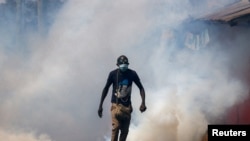Veteran opposition leader Raila Odinga called for three days of demonstrations this week, but appetite for the protests had largely waned by Thursday in most of the country, with schools and shops reopening.
The demonstrations, planned for Wednesday to Friday, are the third round of protests that the opposition has called this month.
In Nairobi's Kibera slum, an opposition stronghold, running battles erupted Friday between police and protesters carrying rocks and crude weapons, while some demonstrators also set fire to tires and used them as barricades, AFP journalists saw.
No violence was reported elsewhere in contrast to earlier demonstrations, which have resulted in 20 deaths since March, according to figures shared by the government and hospitals.
At least 300 people were arrested, including several senior opposition leaders, and several people were reported shot, some possibly fatally, in clashes with police on Wednesday and Thursday.
Kenyans have been struggling with high inflation since last year and earlier in the day, a crowd gathered in Kibera for a peaceful protest, banging pots and pans and chanting anti-government slogans about the cost of living.
But the scene turned ugly later, with demonstrators shouting "today is the final day" as they battled the police, who have been accused by rights campaigners of deploying excessive force.
"We are witnessing a disturbing pattern of police operation that exposes the country to civil strife and informal repression," said the Police Reforms Working Group, a coalition of 29 civil society groups including Amnesty International.
"Police are now working together with what appears to be private militia to attack and butcher people," it said, adding that campaigners had documented 27 "extrajudicial, summary, and arbitrary executions" of protesters in July alone.
Kenyan police have previously been accused by rights groups of using excessive force and carrying out unlawful killings, especially in poor neighborhoods.
'Engage in dialogue'
The violence has alarmed Kenyans and the international community alike, with the Commonwealth Secretariat on Thursday joining calls for the two sides to hold talks.
"The Commonwealth is deeply concerned at the ongoing escalation of violence, conflict and loss of life in Kenya and calls on all leaders and communities to engage in dialogue," it said.
"We call on leaders of all sides of the political divide to de-escalate the situation."
Odinga called off demonstrations in April and May after President William Ruto agreed to dialogue, but the talks broke down.
Ruto has urged a halt to the protests, accusing the opposition of sabotaging efforts to revive the economy.
Odinga says Ruto's government is illegitimate and responsible for a cost-of-living crisis.
The interior ministry said late Thursday that normalcy had returned to the country "save for a few cases of looting and breach of the peace by small bands of marauding lawbreakers".
"The ill-advised and unlawful outrage of crime has been thwarted and will not be allowed to re-emerge," it said.
Information for this report came from AFP and Reuters.









Forum